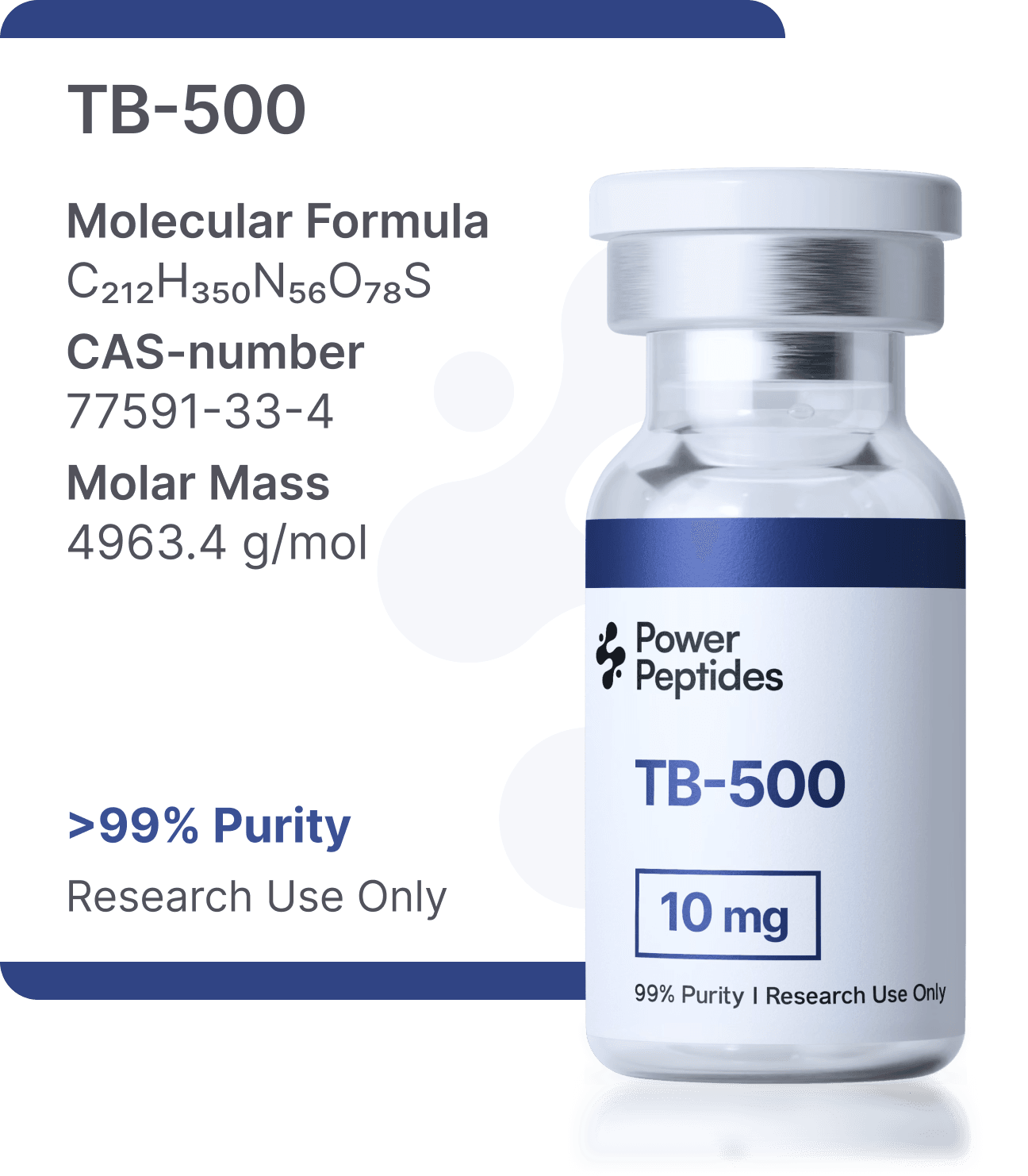TB-500
Product information
$147.99
Product description
Free FedEx 2Day® on orders $200+
Free FedEx Standard Overnight® on orders $500+
Third party tested
- Buy 3+ for $140.59 each and save 5%
- Buy 5+ for $133.19 each and save 10%
- Buy 10+ for $125.79 each and save 15%

Bacteriostatic Water
For every $400 you spend, get 1 FREE bottle of Bacteriostatic Water to reconstitute your peptides.

Peptides. Deep Dive
Research-based Podcast
TB-500
Listen
Introduction to Peptides
How peptides work
This product is intended solely for use as a research chemical in vitro and laboratory experimentation by licensed, qualified professionals.
Advanced Laboratory Testing
Testing
Assay
Test
Test
Screening
- TB-500 Characteristics
- What is TB-500 and How does it work?
- TB-500 Peptide Benefits and Research Findings
- TB-500 Side Effects
- Summary
- References
- Certificate of Analysis (COA)
- Resource
Table of Contents
- TB-500 Characteristics
- What is TB-500 and How does it work?
- TB-500 Peptide Benefits and Research Findings
- TB-500 Side Effects
- Summary
- References
- Certificate of Analysis (COA)
- Resource
TB-500 Characteristics
Molecular Formula | C212H350N56O78S |
CAS Number | 77591-33-4 |
Molar Mass | 4963.4 g/mol |
Amino Acid Sequence | Ser-Asp-Lys-Pro-Asp-Met-Ala-Glu-Ile-Glu-Lys-Phe-Asp-Lys-Ser-Lys-Leu-Lys-Lys-Thr-Glu-Thr-Gln-Glu-Lys-Asn-Pro-Leu-Pro-Ser-Lys-Glu-Thr-Ile-Glu-Gln-Glu-Lys-Gln-Ala-Gly-Glu-Ser |
Synonyms | Thymosin Beta-4, Tβ4, TMSB4X, PTMB4, TB500 |
Solubility | Water-soluble |
Organoleptic Profile | White to off-white powder |
Composition | Lyophilized powder - requires reconstitution |
What is TB-500 and How does it work?
TB-500 is a synthetic version of Thymosin Beta-4 (Tβ4), a naturally occurring 43-amino acid peptide conserved across species and expressed in various tissues. Research has shown that TB-500 interacts with actin, a protein crucial for cell migration and tissue remodeling. This interaction promotes actin polymerization, which is essential for angiogenesis and cell migration to injury sites.
Studies have demonstrated that TB-500 modulates the expression of genes involved in inflammation, wound healing, and tissue regeneration. For instance, it has been found to upregulate matrix metalloproteinases (MMPs), enzymes key to extracellular matrix remodeling and wound healing.
TB-500 Peptide Benefits and Research Findings
Research in mammalian models has revealed:
- Wound healing: TB-500 has been shown to enhance keratinocyte and fibroblast migration, stimulate angiogenesis, and reduce inflammation, contributing to faster healing in various wound types.
- Anti-inflammatory effects: Studies have demonstrated TB-500's ability to reduce pro-inflammatory cytokine production and increase anti-inflammatory cytokine levels in various inflammatory conditions.
- Hair growth stimulation: Research using mammalian models has found that TB-500 can increase hair follicle size and promote the transition from telogen to anagen phase.
- Neuroprotection: Studies have explored TB-500's potential to reduce neuroinflammation, oxidative stress, and apoptosis in models of neurological disorders.
- Cardioprotection: In mammalian models of myocardial infarction, TB-500 has been shown to reduce infarct size, improve cardiac function, and promote angiogenesis.
These TB-500 peptide benefits make it an important subject of ongoing research in tissue repair and cellular recovery.
While these findings are promising, it is important to note that TB-500 is currently a research tool, and its effects in mammals are still being studied.
TB-500 Side Effects
Injection site reactions (pain, redness, swelling)
Headache
Nausea
Dizziness
Fatigue
Summary
TB-500, a synthetic version of the naturally occurring peptide Thymosin Beta-4, has shown remarkable potential in various research settings. The peptide has been extensively studied for its ability to promote wound healing, reduce inflammation, stimulate hair growth, provide neuroprotection, and offer cardioprotection. TB-500 exerts its effects through multiple mechanisms, including its interaction with actin, modulation of gene expression, and regulation of inflammatory pathways.
As a research tool, TB-500 offers a valuable opportunity to explore the complex mechanisms underlying wound healing, inflammation, and tissue regeneration. The insights gained from these studies may pave the way for the development of novel therapeutic strategies for a wide range of conditions, from skin wounds and hair loss disorders to neurodegenerative diseases and cardiovascular disorders.
References
Resource
Free Peptide Research Ebook
Become a member and receive your free copy of our exclusive Peptides eBook.

Why become a member?
Full access to research peptide catalog
Experimentation tips from experts
Free ebook on peptide research
10% off your next purchase
Blogs and podcasts on peptide science
Your Reliable Source for High-Quality Research Peptides
Power Peptides™ is more than just a trusted U.S. supplier of research peptides. We are a catalyst for scientific advancement, dedicated to providing the highest quality peptides that empower our clients to push the boundaries.
Unparalleled Quality
Our proprietary processes and meticulous sourcing of premium materials ensure that every peptide we offer meets the most stringent standards.
Independently Verified
Every product undergoes extensive testing, both in-house and through independent, third-party laboratories.
Fast Shipping & Support
We provide fast and reliable shipping, using the best couriers and high-quality packaging materials to ensure that your peptides arrive promptly and in optimal condition.

